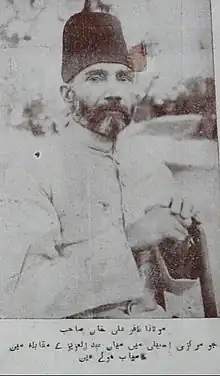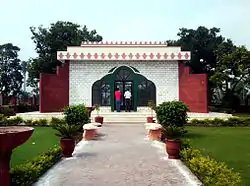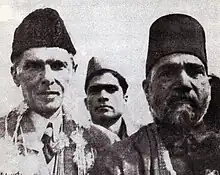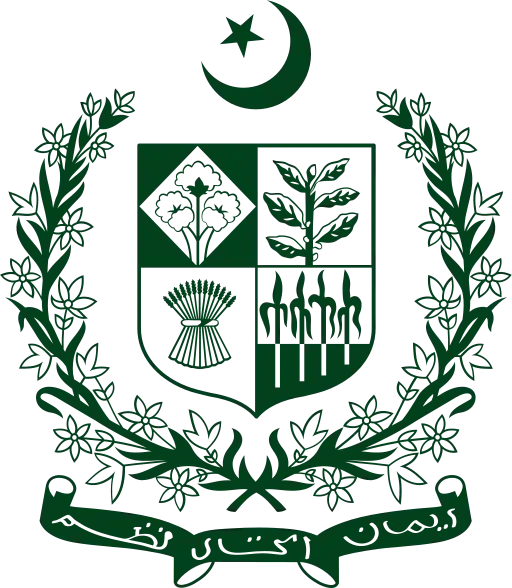Zafar Ali Khan
Zafar Ali Khan (1874– 27 November 1956) (Punjabi: ظفرؔ علی خان – Ẓafar ʿAlī Xān), also known as Maulana Zafar Ali Khan, was a Pakistani writer, poet, translator and a journalist[2] who played an important role in the Pakistan Movement against the British rule.[3][4]
Zafar Ali Khan | |
|---|---|
 Maulana Zafar Ali Khan | |
| Born | 1873[1][2] |
| Died | 27 November 1956 (aged 82–83)[1][2] |
| Occupation(s) | Poet, journalist[1] |

Well-versed in Islamic as well Western knowledge such as the latest trends in economics, sociology and politics, he has been considered as one of the fathers of Urdu journalism.[5]
Early life
Zafar was born into a Punjabi Jat family of the Janjua clan[6] in Sialkot, British India. He received his early education at Mission High School, Wazirabad, Wazirabad District,[7] matriculated (10th grade) from Patiala, and passed his intermediate (12th grade) from the Aligarh College. Next, he worked in the postal department of the state of Jammu and Kashmir, the same place where his father worked, but resigned over a row with his seniors.[7][8] He rejoined Aligarh College and gained his BA degree from there; stood fifth in his batch.[8]
Career
After graduation, Khan was appointed secretary to a Muslim political leader Mohsin-ul-Mulk, then in Bombay. Then he worked for some time as a translator in Hyderabad, Deccan, rising to the post of Secretary, Home Department. He returned from Hyderabad and launched his daily Zamindar newspaper from Lahore , founded by his father Maulvi Sirajuddin Ahmad.[8][9]
Relation with the Ahmadiyya Movement
Zafar Ali Khan's relationship with the Qadiani movement was belligerent. He was among the vanguard, who censured Mirza Ghulam Qadiani for writing poems mocking him. He even wrote the preface to the book "His Holiness", which was written as a refutation of the Qadiani movement.[10] Later on, when Pakistan was created he was an ardent participant of the 1953 Tehreek e Khatm e Nabuwat (a movement against the Qadianis), writing fervorous articles against them.
Poetry
He chose to write in Urdu. Khan's interest in poetry began in his childhood. His poems have religious and political sentiments.[4] He was especially versed in impromptu compositions. His poetical output includes Baharistan, Nigaristan, and Chamanistan. His other works are Marka-e-Mazhab-o-Science, Ghalba-e-Rum, Sayr-e-Zulmet and an opera Jang-e-Roos-o-Japan.[11]
Most popular Naats
- 'Woh shamaUjalaa jis ne kiya 40 baras tak ghaaron mein' sung by Mehdi Hassan, a Radio Pakistan production, a popular Naat written by Zafar Ali Khan[12]
- 'Dil jis se zinda hai woh tamanna tum hi tau ho' sung by Muneeba Sheikh, a Pakistan Television production, a popular Naat written by Zafar Ali Khan[13]
Death
He died on 27 November 1956, in Wazirabad, Punjab. His funeral prayer was led by his companion Mohammad Abdul Ghafoor Hazarvi.[2]
Memorials and legacy

Sahiwal Stadium, а multi-purpose stadium in Sahiwal, Punjab, was renamed as Zafar Ali Stadium in his honour. It is used for football and cricket games. The stadium holds 10,000 people.
He served the Pakistan Movement and was an outspoken activist against British rule. Recognising Zafar Ali Khan's contributions to the Pakistan Movement, the Punjab government in Pakistan established a 'Maulana Zafar Ali Khan Trust' that initiated the 'Zafar Ali Khan Award' for outstanding journalists to be awarded every year.[14] A public degree college in Wazirabad is named after him as Government Molana Zafar Ali Khan Degree College.
Pakistan Post issued a commemorative postage stamp in his honor in its 'Pioneers of Freedom' series.[1]
Books
Some of his notable publications include:
Poetry
Essays
- G̲h̲albah-yi Rūm : ek tārīk̲h̲ī tafsīr, historical commentary of Sūrat ar-Rūm on the victory of Romans over the Persians and the Muslims over the Meccan polytheists as predicted by Koran in AD 615
- Taqārīr-i Maulānā Ẓafar ʻAlī K̲h̲ān̲, speeches of the author, especially in regard with the Khilafat movement
- Lat̤āʼifuladab, on the relation between literature and Islam
- Mʻaās̲h̲irat, on the social sciences
- Jamāluddīn Afg̲h̲ānī : yaʻnī itiḥād-i Islāmī ke muharrik-i aʻzīm, Misr, Ṭarkī, Īrān aur Hindūstān ke z̲arīʻah ʻalim-i Islām man̲, biography of the Muslim reformer and independence fighter Jamāl al-Dīn al-Afghānī
Plays
- Jang-i Rus va Japān : yaʻnī ek tārīk̲h̲ī ḍrāmā, a play on the Russian Japanese War, 1904–1905
Translations
- Jangal buk, Urdu translation from the English of Rudyard Kipling's Jungle Book
- Al-Farooq : the life of Omar the Great, English translation from the Urdu of Shibli Nomani's Al-Farooq, a biography of Umar
See also
Notes

Maulana would never miss a chance to snub the British government and the Heavens had provided him ample opportunities to carry out his sacred mission. Shaheed Ghazi Ilam Din had killed a blasphemous person and was sent to gallows in the Mianwali jail. The government buried him in Mianwali which infuriated the Muslims in Punjab. They protested and made a unanimous demand to bring Shaeed's body to Lahore but no one was prepared to give coverage to their voice as Hindus dominated most of the newspapers in the old Punjab before 1947. A large procession led by Lal Din Qaiser reached the office of Zamindar in 1903 newspaper which was the only hope for the Muslims at that time and succeeded in getting newspaper coverage for their event.
References
- Profile and commemorative postage stamp image of Zafar Ali Khan on findpk.com website Retrieved 4 July 2018
- Rauf Parekh (19 November 2012). "Pakistani writers show renewed interest in Zafar Ali Khan's works". Dawn. Pakistan. Retrieved 4 July 2018.
- Raja Asad Ali Khan (27 November 2012). "Profile of Maulana Zafar Ali Khan – the history maker". The Nation (newspaper). Retrieved 4 July 2018.
- Markus Daechsel (1 June 2002). Politics of Self-Expression. Routledge. pp. 64–. ISBN 978-1-134-38371-9. Retrieved 4 July 2018 – via Google Books.
- "Maulana Zafar Ali Khan". The Nation. 27 November 2014.
- Report of the Committee Appointed in the Government of India to Investigate the Disturbances in the Punjab, Etc, Volume 5, 1920, p. 253. "Zafar Ali Khan, Jat Janjuah (...)"
- Profile of Zafar Ali Khan on storyofpakistan.com website Published 1 January 2007. Retrieved 23 October 2019
- "Profile of Maulana Zafar Ali Khan (1874–1956)". Journalismpakistan.com website. Retrieved 4 July 2018.
- Ayesha Jalal (2000). Self and sovereignty: individual and community in South Asian Islam since 1850. pp. 184–. ISBN 978-0-415-22077-4. Retrieved 4 July 2018.
- Phoenix. "His Holiness by Phoenix (Preface by Maulana Zafar Ali Khan)" (PDF).
- K. C. Kanda (1 January 2005). Masterpieces of patriotic Urdu poetry: text, translation, and transliteration. pp. 161–. ISBN 978-81-207-2893-6. Retrieved 4 July 2018.
- A popular Naat written by Zafar Ali Khan on YouTube Retrieved 4 July 2018
- Zafar Ali Khan's Naat sung by Muneeba Sheikh. Retrieved 4 July 2018
- 'Zafar Ali Khan Award' for outstanding journalists initiated, The Nation (newspaper), published 18 January 2012. Retrieved 4 July 2018
